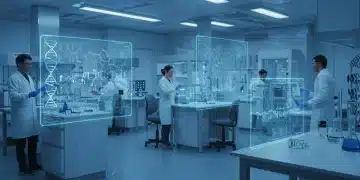Expert analysis on healthcare industry trends and insights

Future predictions for the healthcare industry include increased personalization through technology, the integration of AI for improved diagnostics, greater accessibility via telehealth, and heightened collaboration among providers to enhance care quality.
Expert analysis on healthcare industry sheds light on the dynamic changes shaping our health systems. Have you ever wondered how technology and policy shifts affect your healthcare experience? Let’s dive into the key factors impacting this vital sector.
Understanding current trends in healthcare
Understanding the current trends in healthcare is essential for patients, professionals, and organizations. With rapid changes in technology and policy, it’s important to stay informed about the transformations taking place.
The rise of telemedicine
One significant trend is the rise of telemedicine. This approach allows patients to consult healthcare providers remotely, making it easier for those in remote areas to access medical advice.
- Improves access to care
- Reduces travel time and expenses
- Offers convenience for both patients and doctors
As we delve deeper into telehealth, it’s clear that many patients appreciate the flexibility it offers. However, it also introduces new challenges such as ensuring data security and maintaining personal connections.
Focus on mental health
Another key trend is the increasing focus on mental health. More people are recognizing the importance of mental well-being and demanding better services from healthcare providers. This shift has led to increased funding and resources directed towards mental health initiatives.
Furthermore, as society becomes more aware of mental health issues, stigma is gradually decreasing. This shift encourages more individuals to seek help, thus improving overall public health outcomes.
Health technology advancements
The integration of technology into healthcare is transforming patient care. Tools like electronic health records (EHRs) streamline processes, ensuring that patient information is accessible and accurate.
- Enhances patient safety
- Facilitates communication between providers
- Improves clinical efficiency
Moreover, technology is enabling innovative treatments, from robotic surgeries to personalized medicine based on genetic information. These advancements are reshaping the landscape of healthcare.
In conclusion, staying abreast of these trends in healthcare helps all stakeholders adapt and thrive in a constantly evolving environment.
Impact of technology on healthcare delivery

The impact of technology on healthcare delivery is profound and transformative. Modern advancements are reshaping how patients interact with healthcare systems. This shift leads to better patient experiences and outcomes.
Telehealth services
One major area of change is telehealth services. Patients can now receive care from the comfort of their homes, which increases access to necessary medical advice.
- Reduces transportation barriers
- Increases patient convenience
- Supports continuity of care
With telehealth, healthcare providers can reach more patients, making healthcare more accessible. This shift not only helps patients in remote areas but also provides convenience for busy individuals.
Electronic health records (EHR)
Another key aspect is the widespread adoption of electronic health records (EHR). EHR systems streamline patient information management, making records accessible to authorized personnel quickly.
- Contributes to patient safety
- Facilitates better communication among providers
- Improves coordination of care
As a result, healthcare providers can make informed decisions faster and improve patient outcomes significantly. The shift from paper records to digital formats is fundamental in modern healthcare.
Furthermore, technology has introduced advanced diagnostic tools that enhance early detection and treatment options. Devices and applications now allow for remote monitoring of vital signs, improving patient management dramatically. Progress in wearable technology provides healthcare professionals with real-time data, allowing them to intervene sooner if issues arise.
The integration of technology into healthcare also fosters patient engagement. Apps and online portals empower patients to take a more active role in their care, helping them track their health metrics and manage appointments.
Challenges facing the healthcare industry today
The challenges facing the healthcare industry today are numerous and complex. From rising costs to staffing shortages, these issues impact the quality of care that patients receive. Understanding these challenges is crucial for improving healthcare delivery.
Increasing costs of healthcare
One of the primary challenges is the increasing costs of healthcare. Patients and providers alike feel the pressure of rising premiums and out-of-pocket expenses.
- Insurance rates continue to climb
- Prescription drug prices are often exorbitant
- Administrative costs are disproportionately high
These costs make it difficult for many patients to access necessary treatments. As a result, some individuals may delay care, leading to worse health outcomes.
Workforce shortages
Another significant concern is the shortage of qualified healthcare professionals. Many regions struggle to find enough nurses and doctors to meet the growing demand for care.
- Burnout among healthcare workers is common
- Training programs struggle to keep pace with demand
- Rural areas face severe staffing issues
This shortage can lead to longer wait times for patients and decreased attention to individual care. With the population aging and requiring more services, addressing workforce shortages has become urgent.
Technological integration issues
While technology offers many benefits, integrating new systems can present challenges. Many healthcare organizations struggle to adapt to new technologies, which can hinder their operations.
Interoperability between systems remains a significant concern, as not all technologies communicate effectively. This gap can lead to incomplete patient information, which is vital for effective treatment.
Furthermore, ongoing training is required to ensure staff can use new tools effectively. This need for continual education adds to the burden on already stretched resources in the healthcare sector.
Future predictions for healthcare systems

Future predictions for healthcare systems are both exciting and complex. As advancements in technology and policy continue to evolve, the landscape of healthcare will undoubtedly change.
Increased personalization of care
One major trend is the move towards more personalized healthcare. With the help of genomics and data analytics, treatments will increasingly be tailored to individual patients.
- Predictive analytics will enhance treatment plans
- Genetic information will guide medication choices
- Patient history will be central to care decisions
This personalization can lead to more effective treatment outcomes, as approaches will be customized based on each person’s unique needs.
Integration of AI technology
Artificial intelligence is expected to play a significant role in future healthcare systems. AI can help analyze large datasets to improve diagnostic accuracy and patient management.
- AI algorithms will assist in early disease detection
- Robotics will support surgeries with precision
- Chatbots will enhance patient interaction
As AI technology becomes more sophisticated, healthcare providers will need to adapt to these changes, ensuring that they can leverage AI’s potential while maintaining the human touch in patient care.
Furthermore, telehealth services are expected to remain an integral part of healthcare delivery. As patients have become accustomed to remote services, the demand for virtual consultations will only grow.
This shift means that healthcare organizations must continue enhancing their digital platforms to meet patient expectations. Accessibility will be key, ensuring that all patients can benefit from remote care options.
Lastly, collaboration between health systems is likely to increase. Sharing information and resources can lead to better patient outcomes and more efficient operations across regions.
FAQ – Frequently Asked Questions about the Future of Healthcare Systems
What role will technology play in future healthcare?
Technology will enhance patient care through personalized treatments, AI diagnostics, and improved telehealth services.
How will patient care change in the future?
Care will become more personalized, focusing on individual needs through data analytics and genetic information.
What challenges does the healthcare industry face moving forward?
Challenges include rising costs, workforce shortages, and the need for effective technology integration.
Why is collaboration important in healthcare?
Collaboration is essential for sharing resources and information, which leads to improved care quality and outcomes.





